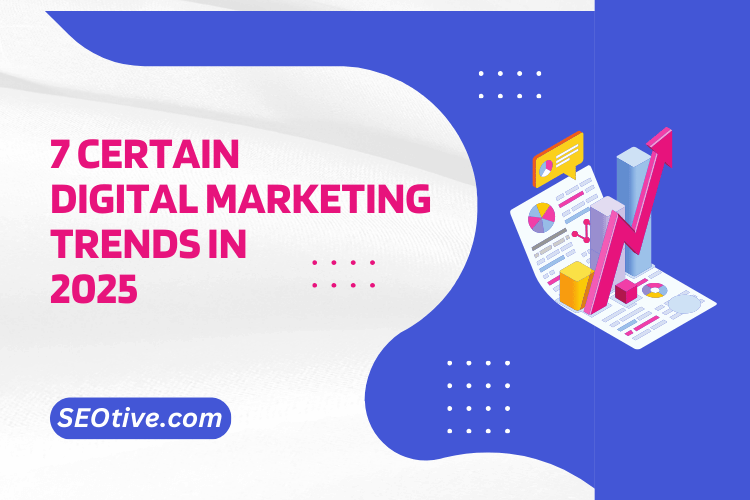
In 2025, digital marketing will continue to evolve, driven by consumer expectations and technological advancements. Marketers will be challenged to combine strategy, authenticity, and innovation. Companies must adapt and anticipate significant changes to differentiate, engage, and transform to remain competitive. What digital marketing trends should you not overlook this year? These seven key trends will help define the year ahead.
Artificial Intelligence (AI) has been a valuable friend of digital marketers for several years. According to the recent survey, it is the biggest business opportunity for companies, industries, and countries in the coming decades. Between now and 2030, global GDP will increase by 14%. Therefore, those lagging in the development of artificial intelligence will be at a severe disadvantage in the coming years.
Creative artificial intelligence will be central to business strategy in 2025, especially when creating mass personalized content. This type of artificial intelligence will enable the creation of relevant content when the tool receives the correct query, i.e., a brief instruction to create content. This will allow companies to offer customers a digital experience that is genuinely relevant to their needs.
Among the changes that will take place in in 2025 is the rise of conversational marketing and chatbots. Artificial intelligence helps these little conversational agents communicate in real-time and generate relevant recommendations, providing a more natural and direct contact, thereby improving the shopping experience.
By 2025, poor-quality sponsored content or products will no longer be recommended by "influence thieves." With commercial agents of influence under scrutiny in the USA, internet users seek high-quality and ethical material.
Therefore, brands have every reason to change their digital strategy and build their marketing campaigns on authenticity and transparency - especially regarding data collection and processing - to build trust with consumers. Brands that want to build customer trust and loyalty through their campaigns must consider their identity, digital experience, and social responsibility. In 2025, sustainable, ethical, and transparent marketing will be more critical than ever.
Social commerce - also known as social shopping - has been on the rise for several years, driven by the pandemic and changing online shopping habits.
As the name suggests, it combines social media and eCommerce. Instagram, Facebook, and Pinterest: Many sites have joined this movement and added direct shopping tools and product catalogs.
Without leaving the platform, users browsing the web can now buy the product that caught their attention directly from the app. For brands, a simple buying process with maximum conversion is very appealing.
In your SEO plans 2025, you must consider the evolution of search behavior.
As far as Google is concerned, in 2025, we will be using Google Lens, which can identify any object in an image or voice search. Voice search relies less on short keywords and is more interactive. Google also promises differentiated search in 2025, again using its generative artificial intelligence called Search Generative Experience (SGE).
But Google is no longer alone: search in 2025 will make room for other players that users will spend more and more time with.
Social platforms include YouTube, and LinkedIn; retail sites such as eBay or Amazon; and artificial intelligence answer generators such as Search GPT.
Phygital marketing is another critical area of digital marketing in 2025. It combines physical and digital marketing, expressing a marketing concept combining digital experiences (online shopping) and physical experiences (in-store sales). The aim is to offer a more flexible and better customer journey. Therefore, phygital is one of the techniques of multichannel marketing.
Augmented and virtual reality are expected to continue to evolve in 2025 as consumers increasingly seek personalized and immersive experiences. Incorporating AR and VR into a marketing plan can better engage customers, present products engagingly, and increase sales by creating a differentiated and memorable shopping experience.
There are many ways to utilize them:
Sales growth is no secret. Social media sales are expected to reach $1 trillion by 2028.
Sales-driven video content will be a massive opportunity for businesses in 2025 as the growing influence of video content on purchase decisions affects markets.
Companies can use their videos to create virtual storefronts and partner with manufacturers to create an engaging shopping environment. In this way, YouTube becomes a digital shop window for consumers, making it easier for them to find and buy.
In 2025, businesses must combine accurate, engaging content with technological capabilities. Companies that use artificial intelligence to highlight, automate, and personalize their values will compete for attention.
The key for marketers will be to master these technologies and adapt to consumer expectations in an ever-changing environment.
Years Experience
Projects Done
Happy Clients
Expert Members
It is a long established fact that a reader will be distracted by the readable content of a page when looking at its layout.